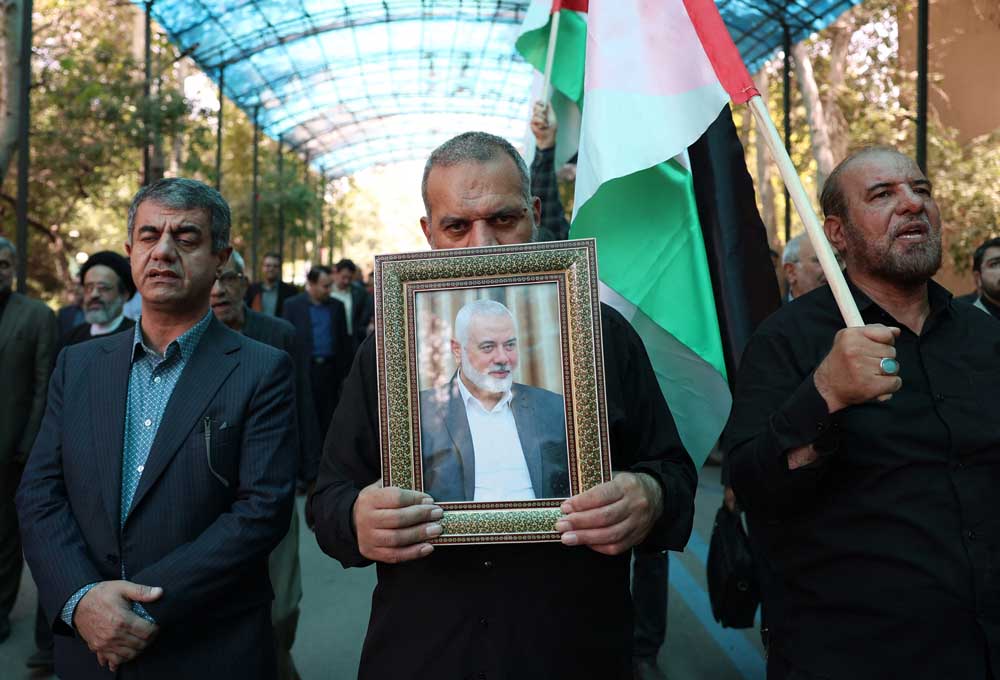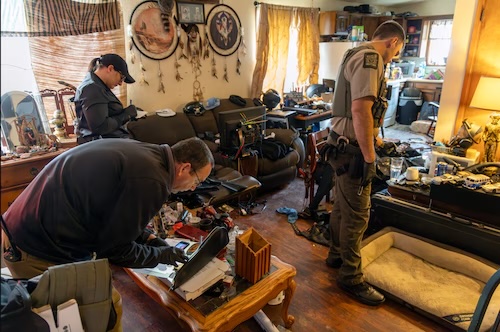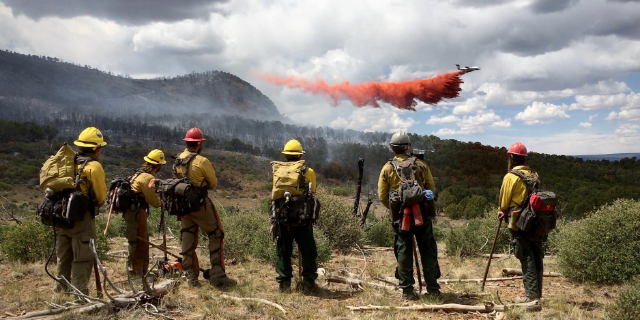Iran rejects calls for compromise and vows to punish Israel
Published 8:00 pm Monday, August 5, 2024

- People hold up the Palestinian flag and a portrait of assassinated Hamas chief Ismail Haniyeh Hamas during a rally at Tehran University, in the Iranian capital Tehran, on July 31, 2024, as Iran declares three days of mourning. (-/AFP/Getty Images/TNS)
TEHRAN, Iran — Iran will not compromise on its planned retaliation against Israel for the deadly attack against the Hamas leader in Tehran.
“As far as the violation of our territorial integrity is concerned, we will not make any compromises,” said Foreign Office spokesman Nasser Kanaani on Monday.
Although Iran does not want any escalation in the region, it will definitely punish Israel for the killing of Ismail Haniyeh, despite attempts at mediation, the spokesman said, according to the ISNA news agency.
Haniyeh, who led the Palestinian Islamist Hamas organization, was killed in Tehran last week in a guest house.
Hamas, Hezbollah killings in an already tense Middle East
The current crisis was also triggered by the recent targeted killing of senior Hezbollah commander Fuad Shukr in Beirut, Lebanon.
Iran and Hamas blame Israel for both attacks. Israel claimed responsibility for the attack on Shukr but has not commented on the accusations regarding Haniyeh’s death.
Tehran and Hezbollah have threatened massive retaliation, while Israeli Prime Minister Benjamin Netanyahu warned of severe consequences should they do so.
A regional conflagration is feared if militias allied with Iran, such as Hezbollah in Lebanon, Hamas in Gaza, the Houthis in Yemen, and militias in Iraq and Syria, get involved.
There has been speculation on social media that Jordan’s Foreign Minister Aiman al-Safadi handed over messages from the United States and Arab countries to Iran during his visit to Tehran on Sunday.
In these messages, the U.S. is said to have promised Iran that it would resume nuclear negotiations if it refrained from a military response. These could lead to the lifting of sanctions against Iran.
Arab states such as Jordan and Egypt are said to have promised Tehran that they would immediately normalize bilateral relations if Iran refrained from retaliation.
Both incentives would be very lucrative for Iran, especially in the context of the country’s massive economic crisis that has lasted almost six years.
There has been no official confirmation of the offers to Tehran.
Emergency meeting of OIC called
An emergency meeting of Organization of Islamic Cooperation (OIC) foreign ministers, on the request of Iran and Pakistan, is to be held in Saudi Arabia on Wednesday.
The meeting in the coastal city of Jeddah will include discussions on the “crimes of the Israeli occupation,” and the “assassination of Haniyeh,” the Saudi-based OIC said.
The Iranian Foreign Ministry said in Tehran that Iran requested the meeting alongside Pakistan.
The OIC, which represents 57 Islamic countries, sees itself as the voice of the Muslim world. Unlike the smaller Arab League, it also includes influential non-Arab states, including Iran, Pakistan and Turkey.
Jordan prepares for possible attack
Jordan is requiring aircraft planning to use its airspace to carry extra fuel so they can leave the area if needed, the country’s civil aviation authority said on Monday.
All incoming aircraft must be refueled in advance with fuel for 45 additional minutes of flight, according to a safety notice issued by the authority. In the event of an Iranian attack on Israel, which could also take place in the skies over Jordan as it did in April, aircraft would have enough fuel to change their route at short notice and land in a neighboring country.
The Jordanian authority’s warning is valid until Tuesday evening at midnight (2100 GMT).
US continues calls for de-escalation
U.S. President Joe Biden on Monday spoke to Jordan’s King Abdullah II, the White House said, with the two leaders discussing efforts to de-escalate rising tensions in the Middle East.
The telephone call included talks on “an immediate ceasefire and hostage release deal” to end the conflict between Israel and the Palestinian militant group Hamas in Gaza, which has threatened to spiral into an all-out regional war.
Meanwhile, U.S. Secretary of State Antony Blinken spoke with Qatari Prime Minister Mohammed bin Abdulrahman and Egyptian Foreign Minister Badr Abdel-Atty, U.S. State Department spokesman Matthew Miller said.
Blinken had also spoken with his counterparts in the region and around the world over the past few to days to deliver “a consistent message,” Miller said.
“We are at a critical moment for the region, and it is important that all parties take steps over the coming days to refrain from escalation and calm tensions.”
The U.S. was concerned about the risk of the conflict escalating, Miller said.
“Escalation is in no one’s interest. It’s not in the interest of any one country. It’s not in the interest of the region, and it’s certainly not in the interest of the millions of civilians who just want to live their lives free from violence and conflict.”
Russia sends ex-defense minister to Tehran
Meanwhile, Russian President Vladimir Putin sent his former defense minister Sergei Shoigu to Iran for talks amid the growing fears of spiraling violence in the Middle East.
Shoigu, who is now secretary of the Russian National Security Council, arrived in Tehran to discuss regional and international security issues, Russian news agencies reported on Monday.
Shoigu plans to meet with two senior officers of the Islamic Revolutionary Guard Corps (IRGC), Ali-Akbar Ahmadian and Mohammad Bagheri, according to reports.
A reception by the new Iranian President Masoud Pezeshkian is also planned.
Discussions are expected to focus on security issues, economic projects, and strengthening bilateral cooperation.
Kyiv has long accused Iran of providing military support to Russia, alleging that Tehran has supplied drones and missiles for Moscow’s ongoing invasion of Ukraine.
Kyiv has stated that Putin may have an interest in escalating Middle Eastern tensions to divert Western attention from the conflict in Ukraine.
Last week, Russia condemned Haniyeh’s assassination and called for restraint from all parties to avoid retaliatory violence.
Russia maintains close ties with both Tehran and Hamas and has previously positioned itself as a potential mediator in the Israeli-Palestinian conflict as it continues its full-scale invasion of Ukraine which began in February 2022.
Current crisis will be a year old in October
The latest escalation stems from the nearly 10-month war Israel has been waging against Hamas in Gaza, triggered by the massacre on October 7 last year in southern Israel.
Hamas militants and other groups killed 1,200 people and 250 were abducted as hostages.
Israel aims to dismantle Hamas as a military and political organization.
According to figures from Gaza’s Health Ministry, more than 39,000 people have been killed and more than 90,000 injured in the coastal strip since the start of the war.
Due to the high number of civilian casualties, Israel has come under international criticism.
Indirect negotiations between Israel and Hamas for a ceasefire and the release of hostages have stalled for months.
_____






